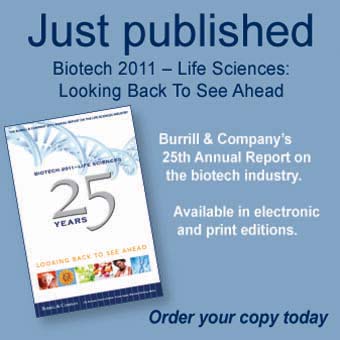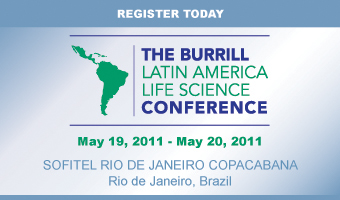The Burrill Report
India’s patent office has denied protection to Abbott Laboratories’ AIDS drug Kaletra allowing generic drugmakers to continue selling their own versions of the drug, Bloomberg reported. The patent office said that the steps involved in making Kaletra do not constitute an invention. The Initiative for Medicines, Access & Knowledge, as well as Cipla and Matrix had challenged Abbott’s patent application. Abbott is reviewing the decision and weighing its options, Bloomberg said. Kaletra is a combination of two antivirals. The product generated about $1.4 billion in sales in 2009, making it Abbott’s second-best seller after the arthritis drug Humira.
A new study in the Journal of Clinical Oncology is adding to the woes for Roche and its blockbuster cancer drug Avastin. It provides more evidence that the anti-cancer medication ups the odds of congestive heart failure in these patients, Health Daily News reported. The analysis of previous studies involved data on almost 4,000 patients and found a small but significant number developed heart failure. "We wanted to raise the issue in the daily practice of oncologists—if they're not aware of this they cannot easily make the connection,” noted the study's lead author, Toni Choueiri, an attending oncologist at the Dana-Farber Cancer Institute in Boston. News of the study follows the U.S. Food and Drug Administration’s decision in December to revoke approval of Avastin as a treatment for breast cancer, although not for other indications.
Merck has terminated its alliance with Ranbaxy Laboratories to develop anti-infective medicines, The Economic Times reported. The two-year-old agreement was worth up to $100 million to Ranbaxy over five years. Both Ranbaxy and MSD Pharmaceuticals, Merck’s Indian affiliate confirmed the development, but refused to give the details or reasons for ending the pact, The Economic Times said.
Inspire Pharmaceuticals said the top-line results from its second, late-stage clinical trial with denufosol tetrasodium for the treatment of cystic fibrosis failed to achieve statistical significance for its primary efficacy endpoint. Inspire CEO Adrian Adams called the results “disappointing and unexpected.” The company plans an analysis of the data to fully understand the results from this trial and the impact on any future development of denufosol. Inspire plans to provide a detailed corporate update by mid-February.
Advanced Life Sciences said that with the oversight of its board of directors the company intends to evaluate strategic alternatives, including a possible sale of the company, with the goal of maximizing shareholder value. The company’s CEO Michael Flavin says the decision to explore strategic alternatives follows an assessment by the company’s board of the registration program for Restanza, its novel antibiotic, and how to best exploit its therapeutic and commercial value. The company said it reached an agreement with the Leaders Bank to amend the terms of its existing loan. As part of the agreement, Leaders Bank has waived the existing defaults and the company has agreed to make an interest reserve payment of $186,000 by January 10, 2011. The due date for the $1.1 million principal payment that is currently due has been extended to April 1, 2011. This $1.1 million principal payment as well as an additional $1 million principal payment also due on April 1, 2011 can be further extended to January 1, 2012 if the Company pays $486,000 in additional interest reserve by April 1, 2011. In conjunction with the execution of the loan agreement the company said it has significantly reduced its operating expenses through a company-wide salary reduction program and other cost reduction activities.
Cumberland Pharmaceuticals said that it has implemented a recall of 6 lots of Acetadote Injection, the company's injectable treatment to prevent or lessen liver injury after ingestion of a potentially toxic quantity of acetaminophen. Cumberland informed the U.S. Food and Drug Administration of its plans to voluntarily recall these lots of Acetadote as a precautionary measure based on observed particulate matter found in a very small number of vials. The source of the particulate matter was from the glass vial produced by a former supplier. The company said the recall, which is not being undertaken on the basis of any known adverse medical events, affects a limited supply of product.
January 06, 2011
http://www.burrillreport.com/article-indian_patent_office_allows_generic_versions_of_abbott%e2%80%99s_kaletra_to_be_sold.html
TRIALS AND TRIBULATIONS
Indian Patent Office Allows Generic Versions of Abbott’s Kaletra to Be Sold
The weekly round-up of failed trials, missed targets, and other business mishaps.[Please login to post comments]

- Why Big Pharma's Got Executive Compensation All Wrong
Podcast: March 28, 2011 Read More - BioConference Live Interview with G. Steven Burrill
A discussion about Biotech 2011-Life Sciences: Looking Back to See Ahead Read More - Betting on Results
Cigna and EMD Serono sign first outcomes-based multiple sclerosis medication contract. Read More - Alzheimer's Fuels a Healthcare Crisis
Podcast: March 21, 2011 Read More - Pfizer Recalls Pain Drug Acquired Through King Deal
The weekly round-up of failed trials, missed targets, and other business mishaps. Read More - Unrealized Savings
Use of $4 generic drug programs could collectively spare patients nearly $6 billion a year in costs, study finds. Read More - Gene Therapy Shows Promise in Treating Parkinson’s Disease
Neurologix’ novel drug improves patients’ symptoms in mid-stage study. Read More - Limiting Payoffs
Changing face of industry threatens hubs. Read More - Human Genome Sciences on the Prowl
Enters licensing deal with FivePrime for novel anti-cancer biologic following its lupus drug success. Read More - Startups Rake in the Cash
Converting waste to renewables heats up. Read More

- Protalix Plans Human Clinical Tests of Medication for Rare Fabry's Disease
Bloomberg - Branded drug prices soar as generic pressure rises
Reuters - China to ban smoking at indoor public places
Reuters - A Panel Decides Washington State’s Health Care Costs
The New York Times - Supreme Court Rules Against Zicam Maker
The New York Times - Anxiety Over Radiation Drives a Sales Surge for a Drug Against Thyroid Cancer
The New York Times - HIV Drug Development Falters as Merck, Bristol-Myers Struggle With Success
Bloomberg - Alzheimer's drug hits two forms of toxic protein
Reuters - Number of Survivors of Cancer Rises 20 Percent
The New York Times - Mexico Puts Its Children on a Diet
The New York Times





.gif)